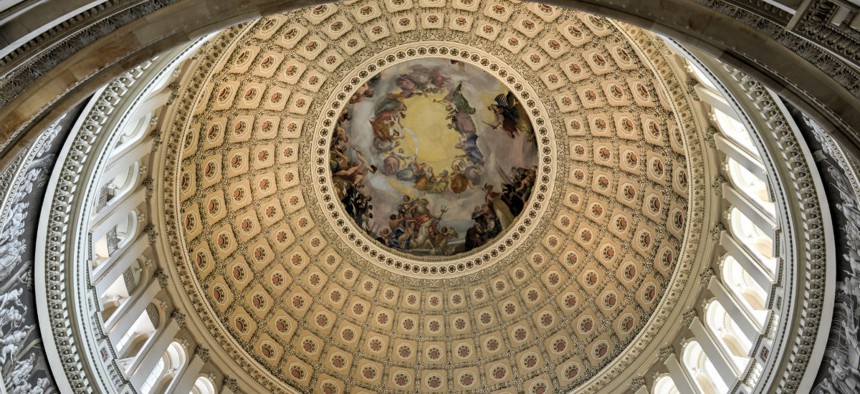
Felix Lipov / Shutterstock.com
Congress Finally Leaves Town, but a Packed September Awaits
After Labor Day, the two chambers will have to figure out how to keep the government open.
Senators dropped plans to try to pass a cybersecurity measure and rushed to catch flights out of humid Washington, D.C., on Wednesday afternoon for a five-week August recess. Members will have to rest up, because they're going to return to a messy, jam-packed fall session.
Senators will return to the Capitol on Sept. 8 to begin debate on a resolution to either approve or disapprove of the administration's nuclear deal with Iran. The latter course is more likely, given Republican control of the chamber, but several key Democrats have announced their support just this week. With only nine days to deliberate once Congress returns, neither chamber appears likely to muster the two-thirds majority necessary to override President Obama's promised veto of a disapproval resolution.
Senate Majority Leader Mitch McConnell is calling for a robust debate process, in which he'll give each senator equal time to speak about the issue on the floor.
That process could provide for some interesting political theater. In a rare request, McConnell is asking that all members stay on the floor and listen to their colleagues for the full debate, cancelling committee hearings and meetings. Sen. Susan Collins of Maine said Wednesday that she was looking forward to the process, noting that she couldn't recall a debate in which every member sat in the chamber since President Clinton's impeachment trial.
Given the seriousness of the issue and the strong opinions of senators on the Iran deal, the debate is likely to be a tense and lengthy one, leaving members with about two remaining weeks in September to deal with other issues.
The other must-pass bill this September won't be any easier: Congress must approve a new government-funding bill before Sept. 30. Senate Democrats have refused to allow Republicans to bring up a single appropriations bill to fund the government this year, trying to force the majority party to prevent sequestration cuts to nondefense spending next year. Republicans, so far, are not biting. And the House's appropriations process is also stalled, with GOP leaders unwilling to bring up spending measures because they fear Democrats will seek to attach language banning the Confederate flag in federal cemeteries.
As a result, Congress will very likely pass a short-term continuing resolution to buy members more time to deal with real questions about the federal government's spending levels.
But even that is a fraught equation, as several Republicans in both chambers hope to use the process to force another vote to defund Planned Parenthood amid a scandal involving the organization's alleged sale of fetal tissue. A vote to do just that failed in the Senate amid Democratic opposition (all but Sens. Joe Donnelly and Joe Manchin voted against the defunding attempt) earlier this week. If Republicans attach the defunding effort to the funding resolution, Congress will again find itself on the brink of a shutdown.
Facing a take-it-or-leave-it approach promoted by some House conservatives, McConnell reiterated to reporters this week a campaign promise he made in 2014: "No more government shutdowns."
When asked if he could support a spending bill that also funded Planned Parenthood, Senate GOP Whip John Cornyn indicated that the 2013 government shutdown over Obamacare wasn't far from his mind.
"I'm for doing what's doable," he said, noting that Sens. Chuck Grassley and Ron Johnson have begun investigations into the allegations. "I'm not for going in any box canyons. We tried that before [and] that didn't work very well."
The Senate is also expected to take up the cybersecurity bill again in September, following an agreement between the two party leaders on Wednesday, but with Iran and the continuing resolution dominating the Senate's schedule, the timing will be tight. Unlike those issues, however, there is no deadline for the cybersecurity bill, and McConnell and Minority Leader Harry Reid agreed Wednesday to bring up the bill at a time of the majority leader's choosing, whether that be in September or later into the fall if the schedule dictates it.
The September rush will be followed by a similar calendar in October, when Congress will have to pass another highway funding bill; the legislation passed just last week expires on Oct. 30. And the Congressional Budget Office has estimated that Congress will have to increase the debt-ceiling limit, a perennial congressional battle, in either October or November.
(Image via Felix Lipov / Shutterstock.com)






